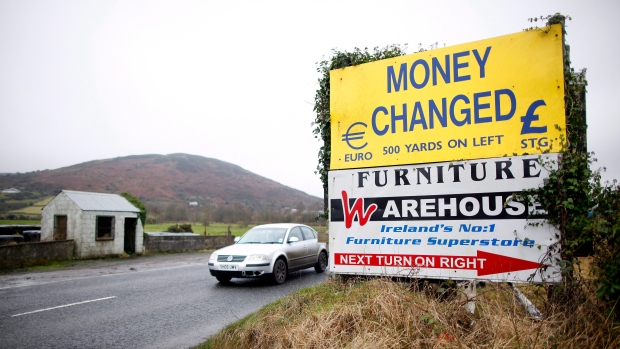Dec 5, 2017
Theresa May, Unionist Party in talks to salvage Brexit deal amid Irish border concerns
, The Associated Press

LONDON -- British Prime Minister Theresa May's government was holding talks Tuesday with the Northern Irish party that props it up, in a bid to salvage a crumbling Brexit deal ahead of a deadline next week.
Britain and the European Union came close Monday to agreeing on key divorce terms, including how to maintain an open Irish border after the U.K. -- including Northern Ireland -- leaves the EU. But a deal was scuttled at the last minute when the Democratic Unionist Party, which keeps May's government in power, warned it would not give its backing.
May characterized the issue as a minor hiccup.
"Our talks with the European Union have made a lot of progress," she said as she met Spanish Prime Minister Mariano Rajoy at 10 Downing St. "There are still a couple of issues we need to work on."
Britain and the EU have only days to make a deal before a Dec. 14-15 EU summit that will decide whether Brexit talks can move on to future relations and trade. The lack of progress so far has raised concerns that Britain may not have a deal by the time it officially leaves on March 29, 2019.
"The show is now in London," EU Commission spokesman Margaritis Schinas said. "We stand ready here in the Commission to resume talks with the U.K. at any moment in time when we get the sign that London is ready."
Schinas said EU officials expect a meeting later this week, "but we don't have any specifics at this stage."
After Britain leaves the bloc, the currently invisible 310-mile (500-kilometre) frontier between Northern Ireland and Ireland will be the U.K.'s only land border with the EU.
Britain says it wants to maintain a "frictionless" flow of people and goods with no border posts. But Ireland and the other EU nations are demanding to know how that will work if Britain is outside the EU's borderless single market and its tariff-free customs union, a looser trading bloc that includes non-EU states like Turkey.
Negotiators were discussing an agreement that would commit Britain to maintaining "regulatory alignment" between Northern Ireland and Ireland after Brexit in order to keep the border transparent for trade, without customs posts or other obstacles.
That language alarmed the DUP, a Protestant Unionist party that opposes any special deal to keep Northern Ireland's economy closely aligned with the Republic of Ireland.
DUP leader Arlene Foster said the party would not accept "any form of regulatory divergence which separates Northern Ireland economically or politically from the rest of the U.K."
The party has only 10 seats in Britain's Parliament but May relies on its support to stay in power. If she ignores the party's wishes her government could fall, triggering a new election with the opposition Labour Party ahead in the polls.
Labour's Brexit spokesman, Keir Starmer, said the Conservative government's fantasies about Brexit had collided with "brutal reality."
"Yesterday the rubber met the road," he said, adding: "The DUP tail is wagging the Tory dog."

